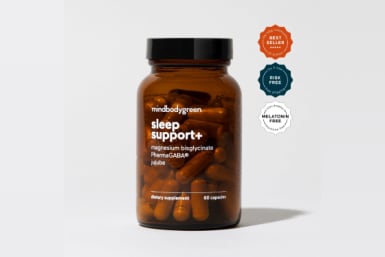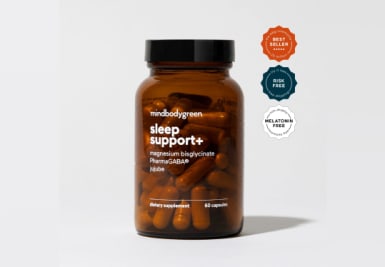Not Everyone Needs 8 Hours Of Sleep: How To Find Your Ideal Number

Somewhere in the annals of sleep history, eight hours became the gold standard for the amount of zzz's we should all strive for nightly. While it's true that most adults could use around seven to nine hours in bed every night, this idea that everyone needs the same amount of sleep has not withstood the test of time.
The eight-hour misconception is one that Rafael Pelayo, M.D., a professor at Stanford Medicine and the author of How To Sleep: The New Science-Based Solutions for Sleeping Through the Night, comes up against time and time again in his line of work. Another board-certified sleep specialist Michael J. Breus, Ph.D., also named it as one of the most common myths in the sleep space on a recent episode of the mindbodygreen podcast.
Here, these two experts break down why optimal sleep varies from person to person, and ultimately from night to night.
Factors that can influence how much sleep someone needs on any given night.
Sleep preferences are likely partially genetic, and research has found that a number of sleep traits and sleep disorders are hereditary1. So the reason that you need nine hours of sleep to feel rested while your co-worker seems fine after six could come down to DNA.
There are, of course, also outside factors that could shift how much rest you'll need to wake up feeling alert. Here are a few that Breus and Pelayo note:
The menstruation cycle:
"I've [seen patients] who need more sleep before they have their period and who need less sleep after they have their periods, and we adjust their bedtimes accordingly," Breus said on the mbg podcast. This is likely due to fluctuations in hormones like progesterone, luteinizing hormone, and prolactin. Uncomfortable cramping can also jolt women awake, and people tend to require more hours of sleep on nights of frequent wakeups.
Seasonal shifts and external stimuli:
Your external environment might also change your sleep needs. If you live in an area that acknowledges daylight saving, for example, Pelayo notes that you might need to shift your sleep routine during the twice-annual clock adjustment.
This idea that our sleep needs shift over the course of a year makes sense from an evolutionary perspective, too. "How could we really be eight-hour sleepers if mothers have to feed their babies every two to three hours when they're nursing?" he says. "There has to be this mechanism built into our brains to avoid sleeping under certain circumstances. You have to be able to push off sleep, take care of something, and go back to sleep later. There's got to be some flexibility in the system."
Health issues:
Sleep is when your immune system repairs itself, so you need more of it when you're actively fighting an infection. And those who constantly need a lot of sleep to feel rested might be dealing with an underlying health condition.
How to find your ideal number.
Ultimately, how you feel when you wake up is the best indicator of your sleep quality. Waking up feeling energized is a good sign that you got the right amount of sleep for your body.
Most people will feel their best when they wake up after completing a full sleep cycle, which lasts around 90 minutes. By this logic, timing your sleep in 90-minute increments isn't a bad idea.
If you're unsure what your ideal sleep number is, play around with setting an alarm so you get 7.5 hours and nine hours of sleep to start, corresponding to five and six sleep cycles, respectively. Note how you feel upon waking, and track your findings in a sleep diary. Add details about what time you got in bed, what time you woke up, what you did in the hours leading up to bed, and what (and when) you ate the night before to get a more complete picture of the habits that enhance or harm your sleep.
Once you find your ideal number—or ideal range—stick to it! When it comes to sleep, the experts stress that consistency is key. That means going to bed and waking up at around the same time every day, even on weekends. Pelayo adds that it's important to leave yourself some wiggle room, too. So if you know you need 7.5 hours of sleep to function at your best, don't get into bed exactly 7.5 hours before your alarm is set to go off.
"As you get older and life gets more complicated, you learn the amount of sleep you need, and that's what you home in on," he says, adding that constantly teetering on a razor's edge like this can make you more vulnerable to the unfortunate side effects of a night of poor sleep. "If you always sleep as little as possible and then don't sleep, the next day you're a basket case."
The bottom line.
Eight hours has long been a gold standard for the amount of sleep people should aim for, but that number won't work for everyone. Like so much of health, sleep is highly individualized, and only you know how much sleep you need to feel your best the next morning. Once you find your ideal number, do your best to honor it.

Emma Loewe is the Sustainability and Health Director at mindbodygreen and the author of Return to Nature: The New Science of How Natural Landscapes Restore Us. She is also the co-author of The Spirit Almanac: A Modern Guide To Ancient Self Care, which she wrote alongside Lindsay Kellner.
Emma received her B.A. in Environmental Science & Policy with a specialty in environmental communications from Duke University. In addition to penning over 1,000 mbg articles on topics from the water crisis in California to the rise of urban beekeeping, her work has appeared on Grist, Bloomberg News, Bustle, and Forbes. She's spoken about the intersection of self-care and sustainability on podcasts and live events alongside environmental thought leaders like Marci Zaroff, Gay Browne, and Summer Rayne Oakes.

